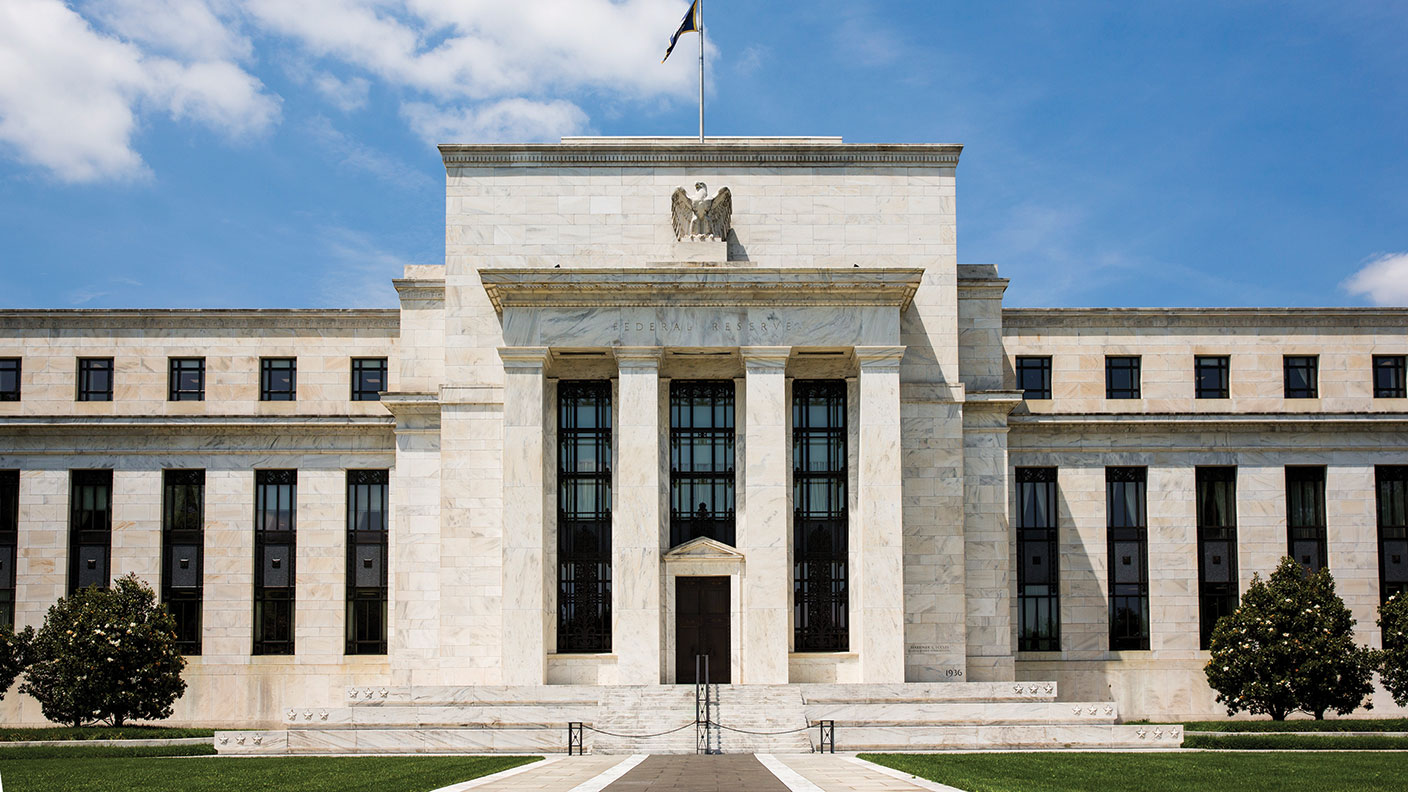Why did SVB collapse and what does it mean for investors?
California-based Silicon Valley Bank collapsed seemingly overnight, casting doubts over the future of thousands of tech and science startups in the US and the UK.


Get the latest financial news, insights and expert analysis from our award-winning MoneyWeek team, to help you understand what really matters when it comes to your finances.
You are now subscribed
Your newsletter sign-up was successful
Want to add more newsletters?
Nearly half of US startups had accounts with Silicon Valley Bank (SVB). So it’s no surprise SVB’s collapse late last week has shaken the industry and prompted wider concerns about the state of the banking sector.
SVB was declared insolvent by the Federal Deposit Insurance Corporation (FDIC), the US banking regulator, on Friday after depositors withdrew more than $40 billion of the bank’s approximately $170bn in assets.
The bank’s collapse is the largest of a US lender since the financial crisis in 2008.
Try 6 free issues of MoneyWeek today
Get unparalleled financial insight, analysis and expert opinion you can profit from.

Sign up to Money Morning
Don't miss the latest investment and personal finances news, market analysis, plus money-saving tips with our free twice-daily newsletter
Don't miss the latest investment and personal finances news, market analysis, plus money-saving tips with our free twice-daily newsletter
SVB UK was also swept up in the collapse. But HSBC announced today it was purchasing the bank, which counts over 3,000 UK clients including tech and science start ups, for £1.
But what happened to SVB, and what does its collapse mean for investors?
What happened to Silicon Valley Bank?
Tech companies boomed throughout the pandemic, which benefitted SVB. It had a lot of money in deposits, which it invested in long-term, fixed-rate US government bonds.
That’s where the problem started.
SVB invested in long-term bonds in the hopes of making more money in a low-interest rate environment. The problem with this strategy is that long-term bonds tend to be more sensitive to interest rates changes.
When interest rates are low, bond prices rise. But when interest rates are high, bond prices fall.
Interest rates remained low throughout the pandemic. But central banks across the world have been hiking them successively over the last few months in order to control inflation.
So when the US Federal Reserve began hiking its base rate, SVB’s bond portfolio plummeted in value.
This spooked depositors who started withdrawing their money. In order to free up capital, SVB dumped its long-term bonds, realising a multi-billion dollar loss.
The lender’s management then tried to raise $2bn to fill the capital gap, but this only caused further panic among the lenders customers.
Customers initiated withdrawals of $42bn in a single day, and the bank was unable to acquire the funds. Shortly after it was declared insolvent by the FDIC.
This was the biggest bank collapse in the US since the financial crisis in 2008.
But Treasury Secretary Janet Yellen said the federal government would not bailout SVB like it did for other banks in 2008.
However there are reports the FDIC is leading an auction to find a buyer for SVB.
The US government said that it will be guaranteeing deposits for SVB account holders, who would be able to access their money from March 13.
The FDIC typically guarantees deposits of up to $250,000, but the government has said it will pay out for all deposits.
What happened to SVB UK?
The future of SVB UK was uncertain following the collapse of its parent company, causing concern among the 3,300 companies that bank with it.
The Bank of England was planning to put SVB UK into insolvency, but HSBC stepped in to purchase SVB UK for £1.
This should “end the nightmare thousands of tech firms had been experiencing over the past few days,” says Susannah Streeter, head of money and markets at Hargreaves Lansdown.
“HSBC shareholders may have some concerns about the bank snapping up assets which have been under such a cloud of uncertainty, particularly the exposure to bonds, but HSBC says it expects a gain to arise from the acquisition.
“This will be hugely welcomed by the government, given the looming crisis risked overshadowing Budget Day, as a big tech sector bailout would not have been a good look when millions have been told there is little extra money to ease the cost-of-living crisis,” Streeter said.
What does this mean for investors?
Understandably the news has spooked investors, and raised questions about whether we’re headed for another financial crisis.
US president Joe Biden and Treasury Secretary Janet Yellen have both attempted to calm markets.
As well as guaranteeing investors’ deposits, the FDIC is offering loan facilities to other banks who hold bonds that have plummeted in value.
Crucially under the loans the assets will be valued at the price they were issued, not their current market price, which will help prevent losses.
The money will come from fees banks pay into the deposit insurance fund, not from taxpayers as it did in the financial crisis.
But still fears remain that smaller US banks “could become the latest dominos to fall”, added Streeter.
Some of the US’s biggest banks have seen their share prices fall following SVB’s collapse. Wells Fargo, Citigroup and Bank of America are down 7.5%, 6% and 7% respectively.
Shares in banks listed on the FTSE 100 also fell – Standard Chartered dropped by 7%, Barclays by 5.5% and HSBC by 4.5% as investors worry about the implications of the purchase of SVB UK.
But the purchase means UK startups will have access to their funds, so they should be able to continue running business as usual.
“The speed of the response by the Treasury shows the importance it places on the UK technology and healthcare sectors and their contribution to the economy,” said John Glencross, CEO and co-founder of VCT manager Calculus. “The UK venture capital, start up and scaleup community should feel reassured by the outcome.”
“The current turbulence may be unsettling, but long-term investing takes endurance and patience and rather than switching and ditching stocks, riding out the storm is almost always a good strategy when things look rocky,” says Streeter.
“This is the time when the priority should be ensuring investors have a diversified portfolio with a wide range of holdings across different asset classes, sectors and geographies.’’
Get the latest financial news, insights and expert analysis from our award-winning MoneyWeek team, to help you understand what really matters when it comes to your finances.
Nic studied for a BA in journalism at Cardiff University, and has an MA in magazine journalism from City University. She has previously worked for MoneyWeek.
-
 Do you face ‘double whammy’ inheritance tax blow? How to lessen the impact
Do you face ‘double whammy’ inheritance tax blow? How to lessen the impactFrozen tax thresholds and pensions falling within the scope of inheritance tax will drag thousands more estates into losing their residence nil-rate band, analysis suggests
-
 Has the market misjudged Relx?
Has the market misjudged Relx?Relx shares fell on fears that AI was about to eat its lunch, but the firm remains well placed to thrive
-
 How a dovish Federal Reserve could affect you
How a dovish Federal Reserve could affect youTrump’s pick for the US Federal Reserve is not so much of a yes-man as his rival, but interest rates will still come down quickly, says Cris Sholto Heaton
-
 New Federal Reserve chair Kevin Warsh has his work cut out
New Federal Reserve chair Kevin Warsh has his work cut outOpinion Kevin Warsh must make it clear that he, not Trump, is in charge at the Fed. If he doesn't, the US dollar and Treasury bills sell-off will start all over again
-
 'Investors should brace for Trump’s great inflation'
'Investors should brace for Trump’s great inflation'Opinion Donald Trump's actions against Federal Reserve chair Jerome Powell will likely stoke rising prices. Investors should prepare for the worst, says Matthew Lynn
-
 'Governments are launching an assault on the independence of central banks'
'Governments are launching an assault on the independence of central banks'Opinion Say goodbye to the era of central bank orthodoxy and hello to the new era of central bank dependency, says Jeremy McKeown
-
 Do we need central banks, or is it time to privatise money?
Do we need central banks, or is it time to privatise money?Analysis Free banking is one alternative to central banks, but would switching to a radical new system be worth the risk?
-
 Will turmoil in the Middle East trigger inflation?
Will turmoil in the Middle East trigger inflation?The risk of an escalating Middle East crisis continues to rise. Markets appear to be dismissing the prospect. Here's how investors can protect themselves.
-
 Federal Reserve cuts US interest rates for the first time in more than four years
Federal Reserve cuts US interest rates for the first time in more than four yearsPolicymakers at the US central bank also suggested rates would be cut further before the year is out
-
 The Bank of England can’t afford to hike interest rates again
The Bank of England can’t afford to hike interest rates againWith inflation falling, the cost of borrowing rising and the economy heading into an election year, the Bank of England can’t afford to increase interest rates again.
